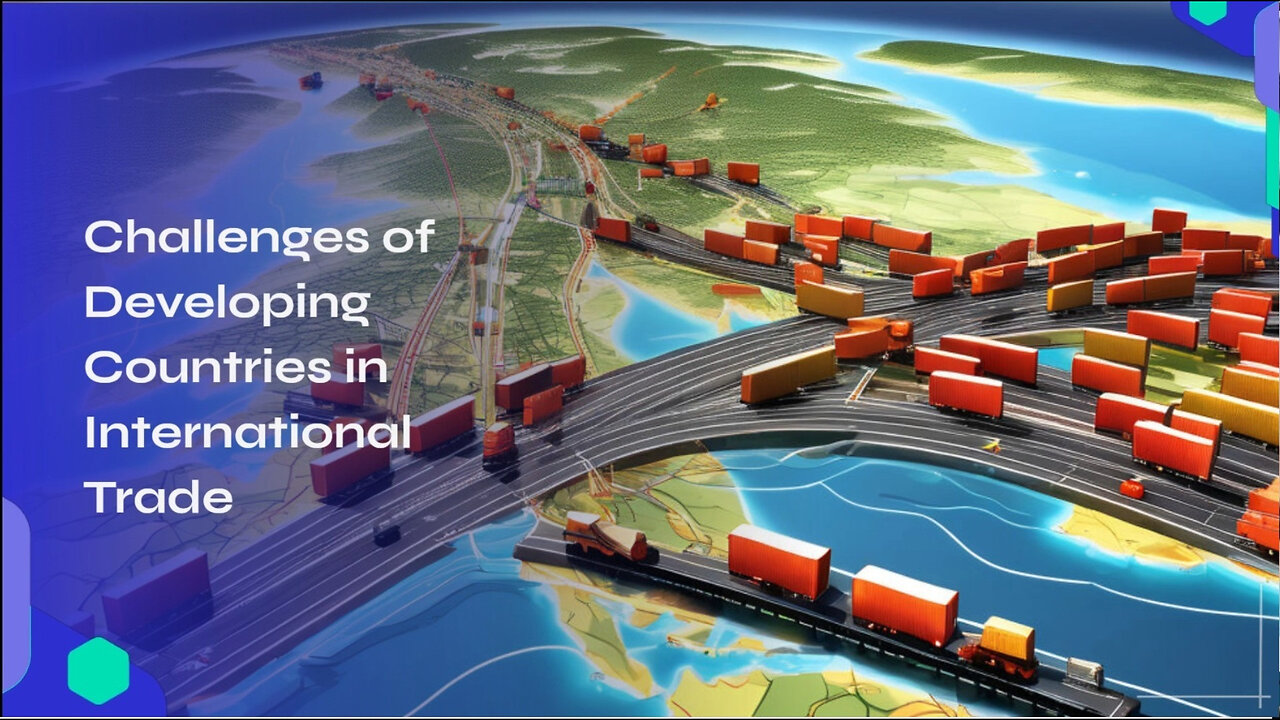Premium Only Content

Narrowing the Gap: Challenges Facing Developing Countries in International Trade
ISF Solution | (832-904-9333)
clearance@isfsolution.com | www.isfsolution.com
In this video, we discussed the challenges that developing countries face in international trade. These challenges include infrastructure limitations, currency exchange rate volatility, trade barriers, customs procedures, the digital divide, and a lack of knowledge about international trade requirements.
Infrastructure limitations, such as inadequate transportation systems, outdated port facilities, and inefficient logistics networks, can lead to delays in the movement of goods, increased costs, and a less competitive position in the global market. Developing countries need to invest in modernizing their infrastructure to facilitate smoother trade operations.
Currency exchange rate volatility poses a significant challenge for developing countries. Fluctuations in exchange rates can affect pricing, profitability, and overall competitiveness in international markets. Developing countries often face higher risks and costs due to these fluctuations, impacting their trade balance and ability to attract foreign investment.
Trade barriers, including tariffs, quotas, and non-tariff barriers, can significantly impact the cost of imported goods and limit access to new markets for developing countries. High tariff rates imposed by more developed nations can hinder trade growth and limit opportunities for developing countries.
Customs procedures and regulations can cause delays, increase costs, and create obstacles for exporters and importers. Administrative corruption and lack of transparency can further exacerbate these challenges. Developing countries need to invest in modernizing their customs infrastructure, streamlining procedures, and enhancing transparency to facilitate smoother trade operations.
The digital divide, characterized by limited access to technology, internet connectivity, and e-commerce platforms, hinders the ability of developing countries to engage in international trade effectively. Limited access to reliable internet connectivity and barriers in adopting digital technologies impede their participation in the growing digital economy and e-commerce opportunities.
Finally, the lack of knowledge and capacity in customs procedures and international trade regulations is a significant challenge for developing countries. Many small-scale businesses and entrepreneurs may not be aware of the necessary requirements, resulting in penalties, shipment delays, and potential trade disputes. Capacity building and knowledge-sharing initiatives are essential to address this challenge.
To overcome these challenges, developing countries need to invest in infrastructure development, regulatory reforms, capacity building, and leveraging technology to create more inclusive and efficient trade systems. By addressing these challenges, developing countries can enhance their participation in international trade and contribute to their economic development.
Thank you for watching! We hope you found this video informative and gained a better understanding of the challenges faced by developing countries in international trade. Stay tuned for our upcoming videos as we continue to explore more topics related to customs brokerage, customs bond, Importer Security Filing, and international trade. Please like, share, and subscribe to our channel to support us. Until next time, happy trading!
#usimportbond #isfcustomsbroker #uscustomsclearing #isfentry
Video Disclaimer Here: For educational purposes - No affiliation with US government sectors.
00:22 Developing countries face challenges in international trade, including infrastructure limitations, currency exchange rate volatility, trade barriers, customs procedures, the digital divide, and a lack of knowledge about international trade requirements.
00:53 Infrastructure, such as transportation and logistics, is lacking in many developing countries, leading to delays, increased costs, and reduced competitiveness in the global market.
01:55 Currency exchange rate volatility poses difficulties for exporters and importers in planning and securing prices, impacting pricing, profitability, and overall competitiveness.
03:23 Trade barriers, customs procedures, and the digital divide further hinder developing countries' ability to engage in international trade effectively. Investment in infrastructure, regulatory reforms, capacity building, and technology is needed to overcome these challenges.
-
 1:30:23
1:30:23
Twins Pod
14 hours agoHe Went From MARCHING With BLM To Shaking Hands With TRUMP! | Twins Pod - Episode 45 - Amir Odom
126K29 -
 1:02:30
1:02:30
Exploring With Nug
15 hours ago $3.38 earned2 Duck Hunters Missing After Kayak Capsizes!
54.6K2 -
 46:48
46:48
Mally_Mouse
8 hours agoLet's Hang!! -- Opening Christmas gifts from YOU!
65.2K1 -
 44:55
44:55
Athlete & Artist Show
20 days ago $2.04 earnedNHL 4 Nations Snubs, Was Hawk Tuah Coin A Scam?
63.7K -
 33:47
33:47
Stephen Gardner
14 hours ago🔥Pentagon Whistleblower UNLEASHES on Biden and Obama!
119K181 -
 2:20:30
2:20:30
The Dilley Show
15 hours ago $27.96 earnedRoger Stone in Studio plus Q&A Friday! w/Author Brenden Dilley 12/27/2024
97.9K21 -
 1:57:02
1:57:02
The Charlie Kirk Show
14 hours agoThe Great H-1B Battle + AMA | Lomez | 12.27.24
184K292 -
 11:39
11:39
Russell Brand
1 day agoWhat You're Not Being Told About The Syrian War
181K287 -
 DVR
DVR
Bannons War Room
1 year agoWarRoom Live
101M -
 1:49:21
1:49:21
Film Threat
16 hours agoBEST AND WORST OF 2024 + SQUID GAME SEASON 2 | Film Threat Livecast
64.6K6